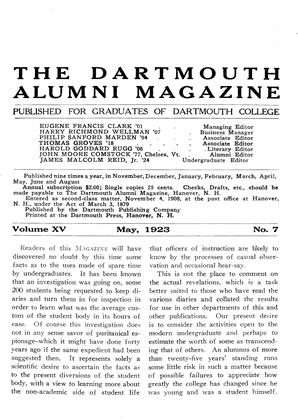Last month marked the unheralded appearance of "La Critique" edited by a so-called group of radicals. Undergraduate opinion flashed resentment at the anonymous attacks upon professors and the chaplain with the result that the editors, whoever they are, have not dared to put out another issue.
The following is the statement of purposes which constituted the first article in the little four-page pamphlet: "First, we believe that Dartmouth College is not an institution of higher learning, but a social institution where good fellows may get together for four years or more and waste time and money in having a good vacation before launching forth upon the sea of life.
"Second, we believe that Dartmouth is graduating each year about 300 'Babbitts' to go forth to exploit others for the good of themselves alone, to become loyal Americans, and never think.
"Third, we believe that Dartmouth men live in an atmosphere of smug complacency and indifference to higher values and the world outside.
"Finally, we believe that a revolution is necessary to change these conditions, and we are therefore establishing this journal of criticism. We shall begin by attacking the most apparent faults in Dartmouth life — the ignorance of the faculty, the smug complacency of the undergraduates, the great God, Athletics, etc."
Other articles attacked the idiosyncracies of professors. Another article ripped the student body up and down, stating that "only 95 per cent of the student body thinks." Fraternity initiations came in for a share of the vitriol and occasion was taken to point out the illusory nature of true fraternal fellowship.
The climax came in an article entitled "Le Chapelain", in which a torrent of unnecessary abuse was poured out upon the chaplain. The vehement disapproval of this attack by the student body and a note of rebuke by President Hopkins which appeared in The Dartmouth brought the anonymous editors of "La Critique" to realize the unfortunate nature of their attack on the chaplain. They apologized to him by means of a letter in The Dartmouth the day after the pamphlet appeared. The last article in the pamphlet, entitled "Jigger, and Jim", was rather good natured and favorably inclined than otherwise.
As one undergraduate put it in regard to its attacks on members of the faculty, " 'La Critique' merely scooped up campus bilge water, collected campus gossip and put it into print. When it gets into print you realize how dirty it is." The concensus of undergraduate opin- ion was that a magazine of destructive criticism is desirable at Dartmouth, but that "La Critique" with its anonimity and spiteful personal attacks could not be tolerated. If men become destructive critics because they see ideals being outraged every day, they are indeed to be encouraged; but if they are motivated solely by a desire to crab, their chortlings should be drowned out with a roar of disapproval.
 View Full Issue
View Full Issue
More From This Issue
-
 Article
ArticleReaders of this MAGAZINE will have discovered no doubt
May 1923 -
 Article
ArticleRAMBLING THOUGHTS OF A CLASS SECRETARY
May 1923 -
 Article
ArticleMEMORIES OF BENJAMIN A. KIMBALL
May 1923 By SAMUEL L. POWERS '74 -
 Class Notes
Class NotesCLASS OF 1911
May 1923 By Nathaniel G. Burleigh -
 Class Notes
Class NotesCLASS OF 1919
May 1923 By John H. Chipman -
 Class Notes
Class NotesCLASS OF 1910
May 1923 By Whitney H. Eastman
Article
-
 Article
ArticleMasthead
December, 1914 -
 Article
Article"Ecstasy" Blows Fuse
June 1940 -
 Article
ArticleA Wah Hoo Wah!
February 1953 -
 Article
ArticleTHE UNDERGRADUATE CHAIR
December 1961 By DAVE SCHWANTES '62 -
 Article
ArticleCourt Order
JANUARY | FEBRUARY 2016 By HEATHER SALERNO -
 Article
ArticleThe Undergraduate
December 1957 By RONALD L. SNOW '58

